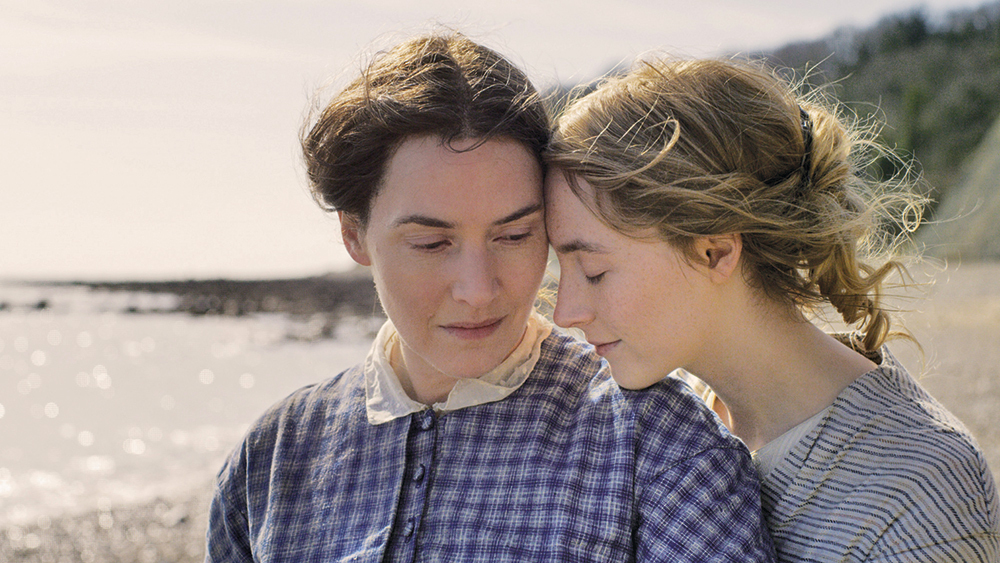The final day at LFF2020 brings the Silver Lion award-winning New Order, another instalment of Steve McQueen’s Small Axe film series, Lovers Rock, and closing night film Ammonite, starring Kate Winslet and Saoirse Ronan.
New Order

Michel Franco’s Silver Lion award-winning film New Order is a deceptive beast, offering a mischievous but ultimately angry view of modern Mexican society on the brink of total collapse. Franco lulls the audience into a false sense of security before pulling the rug out from underneath us at almost every turn in a masterful (un)balancing act of rising tension, offering a dystopian worldview that can feel very close to home, especially as the world suffers through a viral pandemic.
At a high society wedding in Mexico City, the distinguished guests drink and gossip, oblivious to the world around them, until an angry protest turns into a full-blown revolution, violently invading their idyllic existence. Meanwhile, bride-to-be Marianne (Naian González Norvind) leaves her own party to try and help her family’s former employee, Rolando (Eligio Meléndez), get medical treatment for his ailing wife. While away she gets caught out on the streets, as the military take over to quash the would-be rebellion and martial law is declared. Unfortunately for Marianne and the citizens of the city, the worst is yet to come.
Pitched somewhere between the moralism of Costa-Gavras and the pessimism of Michael Haneke, writer/director Franco has created a pop-art polemic of the 21st Century. Gorgeously shot by cinematographer Yves Cape (Holy Motors) and featuring disturbingly beautiful (but digitally rendered) shots of a modern Mexico City torn apart by civil unrest, New Order draws us in with its eye-popping visuals. Franco expertly deploys this overt style to then counterpoint it with sudden acts of violence, breaking the spell he has conjured to bring home the nasty reality being suffered by his characters.
To say more would be to ruin the experience of this remarkably bleak dystopian vision, but will say it is a recognisable one as the world locks down in defence against Coronavirus. Some of the measures put in place by the Mexican state in response to the events in the film, the eponymous new order, can feel like only a much more exaggerated version of what is occurring around the world. Of course, the actions committed by some in the film has already occurred in many other countries in the past and in the present, but what the film offers is – for those who don’t know, or who have forgotten – an extreme view of a society that, in the blink of an eye, is turned over to authoritarians. Something which is far too plausible to be pure fiction.
Director: Michel Franco
Cast: Samantha Yazareth Anaya, Dario Yazbek Bernal, Patricia Bernal
Writer: Michel Franco
Lovers Rock

In another instalment of his upcoming Small Axe series, Steve McQueen jumps decades ahead from his previous Mangrove to look at the same West Indian community in London, but this time in the 1980s. Rather than a traditional narrative though, McQueen focuses on a small group of revellers in Ladbroke Grove as they attend a party being held in a communal flat. A heady mix of emotions, romance and music combine to create a loving snapshot of a particular moment in time, with all its nostalgic joys but without shying away from the dark realities as well. Weaving together disparate storylines that play out in deference to the exultant experience of it all, Lovers Rock is a wonderful slice-of-life from one of the world’s top filmmakers.
We are quickly introduced to a group of men and women setting up for the party. The women cook curries in the kitchen for their impending guests, while the men haul turntables and speaker systems out of a van to set up in the living room. They laugh and joke and sing, their excitement for the party filling the house with positive energy. Meanwhile, Martha (Amarah-Jae St. Aubyn) and her best friend Patty (Shaniqua Okwok) get all dolled up in anticipation of a night of dancing and romantic entanglements. This party is the social event of the season and there is nothing that is going to spoil it, not even the group of menacing white boys who look on from down the street with dark intentions.
Lovers Rock is named after the style of reggae known for its romantic content and McQueen makes the cinematic equivalent with this joyous, real-time exploration of what it means to be young. Focusing on a single night and a small group of people, the bare bones plot takes a back seat to the experience of being amongst it all, where you can almost feel the heat and the thump of the music in the floorboards. Anyone watching this who went clubbing or hosted a house party in their youth will relive the overwhelming intoxication of the night, as emotions run high and human connection is paramount.
McQueen yet again delivers an exciting portrait of a specific world that is comprised from real-life, yet with an added poetry that elevates the material. Usually though, his films feature characters in some state of crisis, and while Lovers Rock does show the potential for something darker lurking on the borders, the overall experience here is one of jubilation, of putting our troubles behind us and just having a good time. McQueen dramatizes this perfectly when the revellers all start singing along to Janet Kay’s classic reggae love song “Silly Games.” The music slowly drops away until all we hear is the off-key singing of the party guests and the shuffling back and forth of their feet on the dancefloor. The scene plays out for the entire song and we are all right there, with the sweat and the tears and the unbounded pleasure of it all, and it is marvellous.
Director: Steve McQueen
Cast: Amarah-Jae St. Aubyn, Micheal Ward, Shaniqua Okwok
Writers: Steve McQueen, Courttia Newland
Ammonite

In Ammonite, writer/director Francis Lee explores the life of pioneering palaeontologist Mary Anning via an invented romance with a young housewife in 1840s Dorset. Lee uses this device to look at gender and sexuality amidst the inequality and repression of the mid-19th Century, while also highlighting Anning’s career and her contribution to science. Unfortunately, this well-acted and intriguing premise feels constrained by its setting and struggles to take flight.
Mary Anning (Kate Winslet) lives a solitary life with her mother (Gemma Jones) in Lyme Regis, selling tourist knick-knacks to supplement her fossil hunting, for which she has earned some renown. Being a woman in the 1840s, she is denied the prestige afforded the primarily male scientific societies, and so when budding palaeontologist Roderick Murchison (James McArdle) arrives she reluctantly takes his money to show him the ropes. When his wife Charlotte (Saoirse Ronan) suddenly falls ill, Mary is called to care for her as Roderick leaves for an expedition. From here a very unlikely relationship blossoms between the two women and they find in each other the companionship and intimacy they have been denied in their separate lives.
The life and work of Mary Anning is very little known and her contributions to palaeontology need to be recognised more widely. She discovered a perfectly preserved ichthyosaur skeleton, which she was forced to sell to the British Museum to make ends meet, but it would take generations for her to finally get the credit she deserved. Ammonite touches on this and Winslet perfectly portrays the downtrodden Mary’s lamentation that, as a woman, her discoveries are co-opted by men. Rather than just focusing on Anning and her career, Lee expands on the themes of gender inequality through her relationship with Charlotte, a woman from a completely different walk of life but who also suffers in silence.
Bringing these two women from different worlds together allows Lee to lay out how women were (and still are) marginalised and their pain reduced and disregarded by men. One of the ways this is dramatized is via Charlotte’s depression after an alluded to miscarriage. As she struggles in its aftermath her husband, rather than be an attentive and helpful partner, treats her like luggage, something to be passed on to others to lighten his burden. When Charlotte learns that Mary had eight siblings die in infancy, the stark reality for what women go through is clearly drawn. These traumatic circumstances are deftly navigated with a tender touch by Lee, allowing a modern eye to view them in the unfortunate times in which they occurred, while being able to reflect on how far society still has to go in regards to women’s rights.
However, regardless of these well-intentioned thematic explorations, and the performances of Winslet and Ronan allowing us access to these women’s lives, it all feels painfully reserved even when in full flight. The film is unable to escape the cold, grey confines of the setting, but then again maybe that’s the point. Despite their liberated emotions, they are still ultimately trapped by the society in which they live, and their secret relationship is the only means by which they can feel truly free. Perhaps the issue here is it feels like this has all been done before. In a year which saw the release of Céline Sciamma’s truly extraordinary Portrait of a Lady on Fire, which also portrays women in love amidst an isolated period setting, Ammonite seems to coast when it should really soar.
Director: Francis Lee
Cast: Kate Winslet, Saoirse Ronan, Gemma Jones
Writer: Francis Lee



